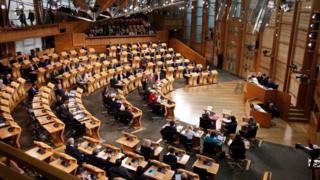 Image copyright
Image copyright
Scottish Parliament
The backing of the Greens gives the SNP a pro-independence majority at Holyrood
MSPs are set to back First Minister Nicola Sturgeon’s call for a second independence referendum in a Holyrood vote.
Members will vote after the resumption of a debate which was cut short in the wake of a terror attack at Westminster.
Ms Sturgeon’s motion asks MSPs to back her in approaching the UK government for permission to hold a referendum.
The Greens are expected to support the SNP in the final vote at 17:00, which should see the motion pass.
However, the UK government has indicated it will reject calls for a new vote in the immediate future, with Prime Minister Theresa May saying “now is not the time” to discuss a referendum.
If the vote passes, Scottish Brexit minister Mike Russell told the BBC’s Good Morning Scotland programme that a letter would be sent to the UK government which will “lay out how we intend to fulfil the mandate of the Scottish Parliament”.
Ms Sturgeon wants the backing of the Scottish Parliament in pursuing a “Section 30” order from the UK government. The power to call a referendum is reserved to Westminster, and this order would transfer the authority to hold a vote to Holyrood.
The debate on the motion started a week ago, on 21 March, but the two-day debate was suspended when Holyrood business was halted in the wake of the fatal attack at Westminster.
Ms Sturgeon wants a referendum “to give the people of Scotland a choice over the future direction and governance of their country”, to be held between Autumn 2018 and the Spring of 2019. The motion “mandates the Scottish government to take forward discussions with the UK government on the details” of this and also calls for Holyrood to set the question, timing and franchise for the vote.
Image copyright
Reuters
Nicola Sturgeon and Theresa May are meeting at a hotel in Glasgow
On the first day of the debate, Ms Sturgeon said Scotland’s future should be decided by the people who live there, rather than being “imposed” on them.
She told MSPs that she could not leave Scotland to “simply drift through the next two years, crossing our fingers, hoping for the best while fearing the worst”.
She added: “It would mean accepting that at the end of this process we will not even have the option of choosing an alternative path, and that the direction of our nation will be decided for us.
“I do not consider that to be right, or fair. The future of Scotland should not be imposed upon us, it should be the choice of the people of Scotland.”
Analysis by Sarah Smith, Scotland editor
It used to be received wisdom in Scottish politics that if Westminster tried to deny a Scottish referendum it could easily backfire and stir up support for independence.
But the unionist parties are confident there is no great public demand for another vote – other than among people who are already committed nationalists.
Opinion polls suggest people are split fairly evenly, about 50/50, on whether they want another vote. And it tends to be Yes supporters who say yes to another referendum and No voters who say no, not now.
The great divide in Scottish politics over the question of independence may only be solidified by this current debate over whether to re-run the 2014 referendum.
Scottish Conservative leader Ruth Davidson said voters were “sick to death of the SNP’s games”, with her MSPs expected to vote against the motion alongside Labour and the Lib Dems.
However, the government is expected to win the vote, with the six Green MSPs joining the SNP’s 63 to give them a comfortable pro-independence majority.
Mr Russell told the BBC that he was not going to take the vote for granted, but said the letter to the UK government “will indicate how we intend to take this forward”.
Speaking on Monday during a visit to Scotland, Mrs May said: “My position is very simple, and it hasn’t changed. It is that now is not the time to be talking about a second independence referendum.
“That’s for a couple of reasons – first of all, now is the point when we’re triggering Article 50, we’re starting the formal negotiations for leaving the European Union.
“Now is a time when we should be pulling together, not hanging apart. Pulling together to ensure we get the best possible deal for the whole of the UK, including the people of Scotland.
“And I think it would be unfair on the people of Scotland to ask them to make significant decision until all of the facts are known, at a point where nobody knows what the situation is going to be.”
MSPs to back call for Scottish independence vote}

